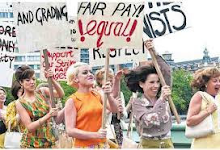Why are the trade unions so bad at getting to grips with equal pay?
A very good question - after all it's been unlawful to discriminate on grounds of pay for almost 40 years - ever since the introduction of the Equal Pay Act in 1970.
In 1997, the trade unions signed a landmark equal pay agreement with the council employers - it was called the Single Status Agreement and took years to negotiate. So both sides signed up with their eyes wide open - they knew very well that to achieve equal pay they had to introduce modern, non-discriminatory pay structures.
At the heart of the Single Status Agreement was a commitment to sweep away years of pay discrimination against many female jobs. The unions and the employers recognised that unskilled male jobs were being paid thousands of pounds more than many female dominated jobs - and that was the real driving force for change.
The unions knew that their women members had cast iron claims, if they challenged the old pay and grading system. So did the employers - and that's why the Single Status Agreement came about.
Yet, the key aspect of the agreement was never implemented. Why? Because it represented an enormous challenge - a sea change - inside the trade unions and affected their sometimes all too cosy relationships with employers.
Achieving equal pay requires a fundamental change of attitude - a culture shift - a real determination to put the less well organised and less vocal groups (i.e. women workers and members) on an equal footing to everyone else.
Women are generally less inclined to be union activists; many have no workplace (e.g. home carers) or are scattered in small groups that seldom meet up; they have more family commitments and less time to make their voices heard - inside organisations that have lots of political baggage and vested interests.
The truth is that the ordinary union members (predominantly women) who stood to gain most form Single Status were effectively outmanoeuvred by a combination of union activists with their own agendas and die-hard opponents among the employers.
So, a complex equal pay agreement - the subject of painstaking consultation, that took several years to negotiate, that was hailed as a major breakthrough at the time - was simply allowed to wither on the vine.
But women workers in London now have a choice - they don't have to rely upon the unions and council employers. Women workers in London can now take control of their own affairs - and pursue an individual equal pay claim with Action 4 Equality and Stefan Cross.
Thursday, 20 March 2008
Subscribe to:
Post Comments (Atom)

No comments:
Post a Comment